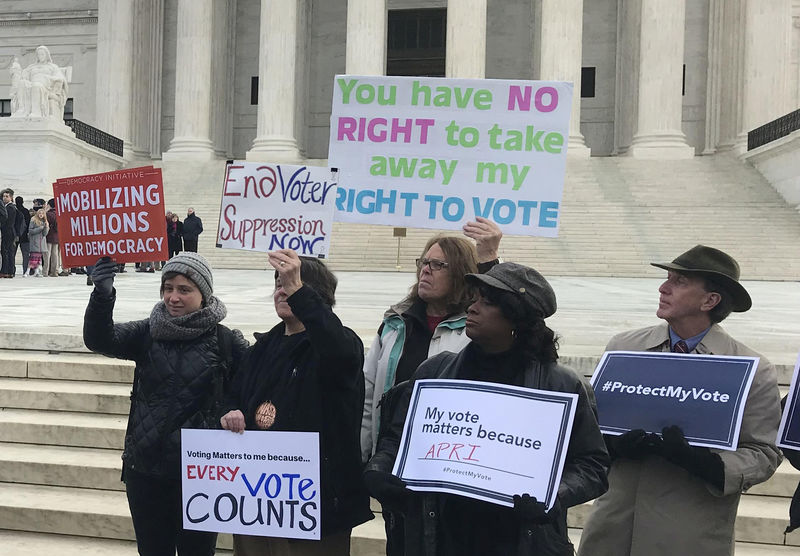By Andrew Chung
WASHINGTON (Reuters) - Conservative U.S. Supreme Court justices were joined by liberal Stephen Breyer on Wednesday in signaling sympathy toward Ohio's policy of purging infrequent voters from registration rolls -- a practice critics say disenfranchises thousands of people -- in a pivotal voting rights case.
The nine justices heard about an hour of arguments in Republican-governed Ohio's appeal of a lower court ruling that found that the policy violated a federal law aimed at making it easier for Americans to register to vote. The 1993 National Voter Registration Act bars states from striking registered voters "by reason of the person's failure to vote."
Indicating he potentially could join the court's conservatives in a ruling upholding Ohio's policy as lawful, Breyer noted that a state needs tools to clean up its voter rolls.
"What are they supposed to do?" he asked Paul Smith, the lawyer representing plaintiffs who challenged the policy and argued that voting should not be a "use it or lose it" right.
Other liberal justices including Sonia Sotomayor asked questions indicating skepticism toward Ohio's policy. The court has a 5-4 conservative majority.
"The reason for purging is they want to protect voter rolls," said Justice Anthony Kennedy, a conservative who often casts the deciding vote in close decisions. "What we're talking about is the best tools to implement that purpose."
States try to maintain accurate voter rolls by removing people who have died or moved away. Ohio is one of seven states, along with Georgia, Montana, Oklahoma, Oregon, Pennsylvania and West Virginia, that erase infrequent voters from registration lists, according to the plaintiffs who sued Ohio in 2016.
They called Ohio's policy the most aggressive. Registered voters in Ohio who do not vote for two years are sent registration confirmation notices. If they do not respond and do not vote over the following four years, they are purged.
The Supreme Court's ruling, due by the end of June, could affect the ability to vote for thousands of people ahead of November's midterm congressional elections.
The arguments zeroed in on whether a state could send a registration confirmation notice based merely on a person's failure to vote, which the plaintiffs argued is barred by federal law.
Chief Justice John Roberts and Justice Samuel Alito, both conservatives, suggested that a person's failure to vote could be used as evidence for possible removal from the registration list. "It's evidentiary, it's not ground for removal itself," Alito told the plaintiffs.
Sotomayor said the policy could further disenfranchise people who already find it more difficult to vote, including minorities and the homeless, those who cannot easily make it to polling places. She suggested it was unreasonable to use non-voting as a trigger for the process.
"People have a right not to vote if they choose," Sotomayor said.
THROWN IN THE TRASH
Smith, representing the plaintiffs, said that the notices the state sends out are typically thrown out by the recipient -- 70 percent are not returned, according to one estimate -- which can lead to a large number of people targeted for removal who should not be.
"I confess to doing that sometimes," Breyer said of putting mailings in the thrash.
Ohio's policy would have barred more than 7,500 voters from casting a ballot in the November 2016 election had the Cincinnati-based 6th U.S. Circuit Court of Appeals not ruled against the state.
Voting rights has become an important theme before the Supreme Court. In two other cases, the justices are examining whether electoral districts drawn by Republican lawmakers in Wisconsin and Democratic lawmakers in Maryland were fashioned to entrench the majority party in power in a manner that violated the constitutional rights of voters. That practice is called partisan gerrymandering.
The plaintiffs suing Ohio, represented by liberal advocacy group Demos and the American Civil Liberties Union, said that purging has become a powerful tool for voter suppression.
Democrats have accused Republicans of taking steps at the state level, including laws requiring certain types of government-issued identification, intended to suppress the vote of minorities, poor people and others who generally favor Democratic candidates.
A 2016 Reuters analysis found roughly twice the rate of voter purging in Democratic-leaning neighborhoods in Ohio's three largest counties as in Republican-leaning neighborhoods.
The plaintiffs include Larry Harmon, a software engineer and U.S. Navy veteran who was blocked from voting in a state marijuana initiative in 2015, and an advocacy group for the homeless.
Dozens of voting rights activists gathered for a rally outside the courthouse before the arguments, with some holding signs displaying slogans such as "Every vote counts" and "You have no right to take away my right to vote."
"This is about government trying to choose who should get to vote. We know that's wrong," U.S. Senator Sherrod Brown, a Democrat from Ohio, said at the rally.
